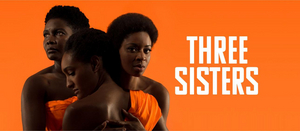Review Roundup: Inua Ellams' THREE SISTERS at the National Theatre

Chekhov's iconic characters are relocated to Nigeria in this bold new adaptation in the Lyttelton at which opened at The National Theatre. Owerri, 1967, on the brink of the Biafran Civil War. Lolo, Nne Chukwu and Udo are grieving the loss of their father. Months before, two ruthless military coups plunged the country into chaos. Fuelled by foreign intervention, the conflict encroaches on their provincial village and the sisters long to return to their former home, Lagos.
The three sisters are played by Sarah Niles, Natalie Simpson and Racheal Ofori.
Cast includes Ronke Adekoluejo, Jonathan Ajayi, Jude Akuwudike, Tobi Bamtefa, Peter Bankolé, Anni Domingo, Lola May, Jerome Ngonadi, Ken Nwosu, Joseph Ogeleka, Nasa Ohalete, Offue Okegbe, Chloe Okora, Sule Rimi and Diana Yekinni.
With set and costume design by Katrina Lindsay, lighting design by Peter Mumford, composition by Femi Temowo, sound design by Donato Wharton and music direction and vocal arrangements by Michael Henry.
Let's see what the critics are saying...
Lucy Brooks, Culture Whisperer: The ambitious scale of this adaptation, which squeezes tribal philosophy, colonialism, cutural diaspora and plenty of politics into a Chekhovian template, is impressive, but overwhelming. The vibrance of the performances and sparky language are let down by a structure that's over-stretched by trying to echo Chekhov and include the full weight of the Biafran conflict. Although there is so much heart and humour and sadness, the play makes for a dense and long three hours. But there's enough insight, warmth and originality to make this Three Sisters memorable.
Michael Billington, The Guardian: Ellams brilliantly uses the context to sharpen specific relationships. The hostility of the sisters to their brother's wife, which in the original seems like snobbery, is explained by the fact that they belong to the dominant Igbo ethnic group, while she is a Yorùbá. The reason for the failure of Nne Chukwu's marriage also becomes clear when you realise it was arranged when she was 12. Above all, the play offers a searing attack on British responsibility for the war dating to the time when they created Nigeria out of 250 ethnic groups and languages.
Tom Birchenough, The Arts Desk: At a tad over three hours it's not a short evening, and some blurring feels evident in the final act, with Ellams introducing a theme of proprietary displacement that's carried over from The Cherry Orchard. (That play's sense of the old order changing is nicely enhanced here by the fact that when Abosede - Chekhov's unbearably motherly Natasha, here finely played by Ronke Adekoluejo - finally asserts control over the family home, she is endorsing her Yoruba identity over her Igbo sisters-in-law, as well as getting sweet revenge on them for having called her a "bush animal".) But this Three Sisters, confidently played by its ensemble cast (pictured above) and technically accomplished on all fronts (plaudits for Peter Mumford's atmospheric lighting and Donato Wharton's sound design), brings a real breath of fresh air to the National.
Nick Curtis, Evening Standard: Ellams's musical language and command of character are superb, but his structuring is weak. The play rises to a false conclusion just short of the three-hour mark. The succeeding, dawdling final act - in which Biafra surrenders and the protagonists line up to have their hopes dashed more systematically and laboriously than in Chekhov's original - feels bolted on. It's a compelling, frustrating evening: you can see a great play trying to come out.
JN Benjamin, The Stage: The performances in Nadia Fall's compelling production are uniformly excellent. Niles, Simpson and Ofori beautifully embody the distinct energies of the sisters. Together, they form a pillar of strength and anchor the piece dramatically and emotionally. Ronka?? Adékolua??jo is also sensational as Abosede; her transformation from awkward and poorly dressed local girl to an ostentatious and salty matriarch is wonderful to behold. There's something incredibly powerful about seeing elements of Nigerian culture and heritage represented in Ellams' stirring adaptation. For many Nigerian-Britons living in the UK, the former Republic of Biafra - now split into several states within Nigeria - is where our parents called home and somewhere many of our grandparents fought to defend.
Alice Saville, Time Out: Ellams's approach feels deliberately educational, clearly pointing to the harm done by a British government that prioritises Nigeria's convenient oil resources over the lives of its people. Where Chekhov's story has a kind of nihilistic irrationality to it, everyone's actions here are rooted in painful recent history. It's a free adaptation that could afford to be freer, to dig into historical events without being tied to its Russian source - but when Ellams finds moments of synchronicity between continents, they're painfully beautiful.
Michael Higgs, The Upcoming: The production by Nadia Fall is excellent, with a lovely set design by Katrina Lindsay and atmospheric lighting by Peter Mumford, and the cast are consistently convincing, with the three sisters being played by Sarah Niles, Natalie Simpson and Racheal Ofori, all of whom are on top of their game. Abosede - Natasha in Chekhov's original - is portrayed by a constantly enthusiastic Ronke Adekoluejo. Generally, all actors incorporate their characters in a way which brings Chekhov's brilliant character developments to life, making it an overall enjoyable experience.
Reader Reviews

Videos
